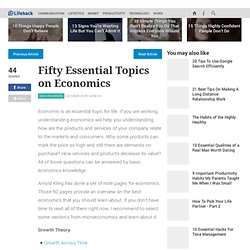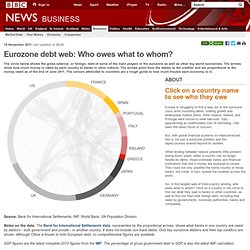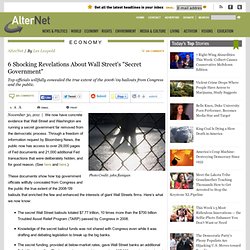

Fifty Essential Topics on Economics. Economic is an essential topic for life.

If you are working, understanding economics will help you understanding how are the products and services of your company relate to the markets and consumers. Why some products can mark the price so high and still there are demands on purchase? How services and products decrease its value? All of those questions can be answered by basic economics knowledge. Arnold Kling has done a set of note pages for economics. Growth Theory Saving, Finance, and Social Security Markets (Microeconomics) Macroeconomics Information Economics. Online economics textbooks. Economic Issues. Politics While not an economist in the traditional sense, I am very interested in the study of economics.

While not everyone shares this level of interest, I believe people should have an understanding of economics as the field is so important to understanding the world that we live in. Though this list contains ideas that are controversial, it is not intended to promote anger or controversy. Rather, these entries were chosen to shed some light on lesser known, yet important economic issues facing our world, and give readers something to ponder. Please give your opinions on these issues in the comments. Also known as the Diamond-Water Paradox, the paradox of value is the contradiction that while water is more useful, in terms of survival, than diamonds, diamonds get a higher market price.
This paradox can possibly be explained by the Subjective Theory of Value, which says that worth is based on the wants and needs of a society, as opposed to value being inherent to an object. Deflation. A Trillion Dollars. Economy 1929 v 2008. How the Stock Market and Economy Really Work. "A growing economy consists of prices falling, not rising.

" The stock market does not work the way most people think. A commonly held belief — on Main Street as well as on Wall Street — is that a stock-market boom is the reflection of a progressing economy: as the economy improves, companies make more money, and their stock value rises in accordance with the increase in their intrinsic value. A major assumption underlying this belief is that consumer confidence and consequent consumer spending are drivers of economic growth. A stock-market bust, on the other hand, is held to result from a drop in consumer and business confidence and spending — due to inflation, rising oil prices, high interest rates, etc., or for no reason at all — that leads to declining business profits and rising unemployment.
The Fundamental Source of All Rising Prices For perspective, let's put stock prices aside for a moment and make sure first to understand how aggregate consumer prices rise. Forced Investing. Eurozone debt web. The circle below shows the gross external, or foreign, debt of some of the main players in the eurozone as well as other big world economies.

The arrows show how much money is owed by each country to banks in other nations. The arrows point from the debtor to the creditor and are proportional to the money owed as of the end of June 2011. The colours attributed to countries are a rough guide to how much trouble each economy is in. Click on a country name to see who they owe Europe is struggling to find a way out of the eurozone crisis amid mounting debts, stalling growth and widespread market jitters. But, with global financial systems so interconnected, this is not just a eurozone problem and the repercussions extend beyond its borders.
While lending between nations presents little problem during boom years, when a country can no longer handle its debts, those overseas banks and financial institutions that lent it money are exposed to losses. GDP: €1.8 tn Foreign debt: €4.2 tn. Wall St's "Secret Government" Photo Credit: john flanigan November 30, 2011 | Like this article?

Join our email list: Stay up to date with the latest headlines via email. We now have concrete evidence that Wall Street and Washington are running a secret government far removed from the democratic process. These documents show how top government officials willfully concealed from Congress and the public the true extent of the 2008-'09 bailouts that enriched the few and enhanced the interests of giant Wall Streets firms. The secret Wall Street bailouts totaled $7.77 trillion, 10 times more than the $700 billion Troubled Asset Relief Program (TARP) passed by Congress in 2008. So what does this all mean?
1. As many of us suspected, all the big banks were on their knees begging for help – secretly – while telling their investors, the public and Congress that all was well. 2. 3.